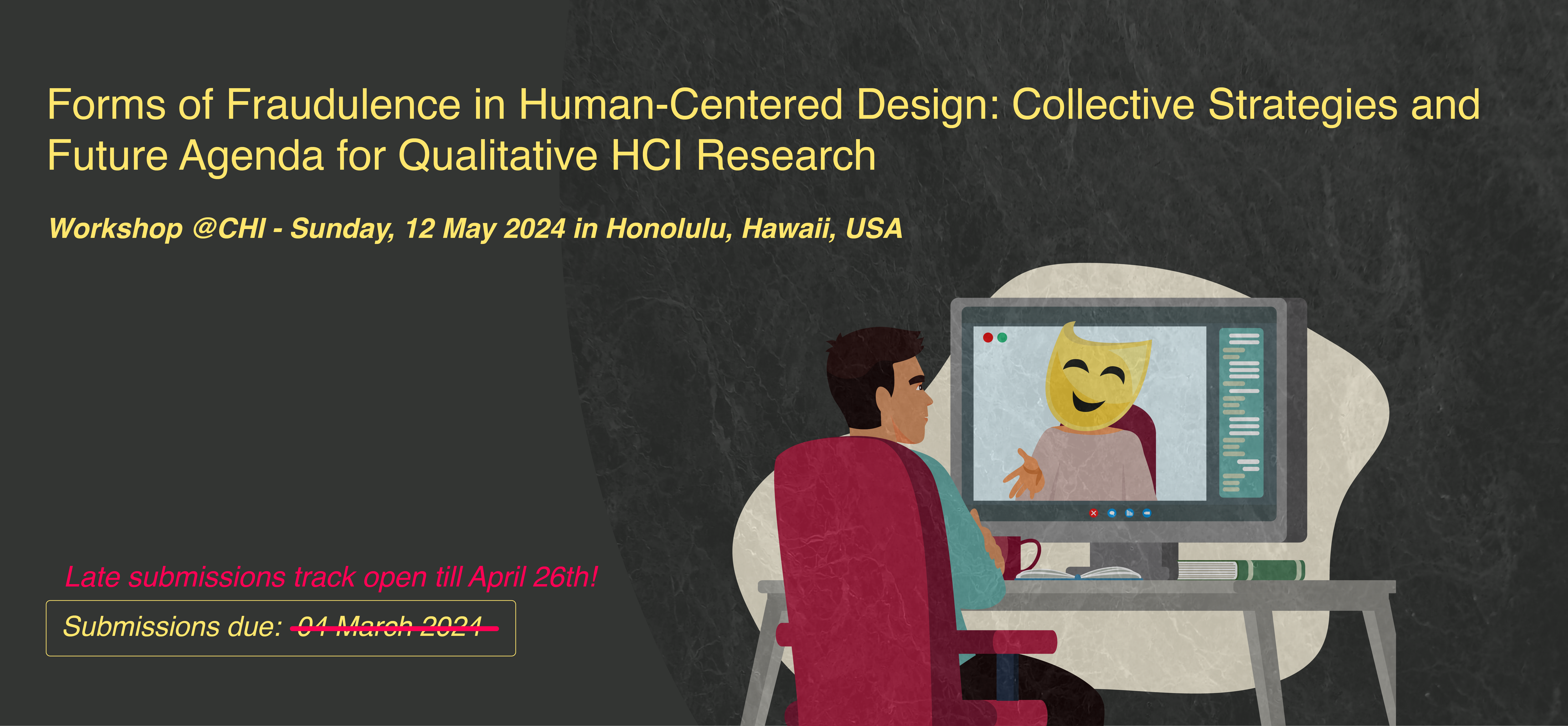
Abstract
New technical forms of deception–including AI deepfakes and unethical uses of ChatGTP–have gained attention in the wider research community and media. There has also been an increase in the coordinated social activities of bad actors posing as legitimate human research participants. People, for example, sign up for online HCI studies by misrepresenting their identities and experiences. This workshop explores what counts as “fraud” in the rapidly changing sociotechnical landscape of qualitative HCI research sites, and how might our community better understand (and strategically handle) new forms of fraudulence in human-centered design. Researchers across academia and industry are invited to participate in this discourse, share their personal experiences, explore potential strategies to combat fraudulence and reflect critically on the efficacies and shortcomings of such strategies. Outcomes of this workshop include working towards better guidelines, forming a community of researchers to support those impacted by fraudulence, and collaboratively defining a research agenda based on workshop discussions.
Read full workshop proposal
Call for Participation
We invite interested researchers to submit, as a case-study, a narrative of their experiences with fraudulence, the challenges, lessons learned, and questions they have moving forward.
We encourage case-study submissions that:
- Explore varied and emerging forms of human/nonhuman fraudulence and the impacts on HCI qualitative research and/or human-centered design
- Critically reflect on how we define and talk about “fraud” in HCI, including examining the roles of academic/industry research groups and user communities
- Unpack fraud in relation to the diversity of qualitative research practice in HCI, including self-reflexive discussions on how we experience the risks and harms of fraud differently both as researchers and people
- Detail experiences with fraud from a particular methodological/theoretical perspective, including but not limited to: ethnography, feminist HCI, participatory design, surveys, online workshops, etc.
- Reflect on fraud from the researcher’s perspective, covering personal accounts of challenges with fraudulence, such as the impact on well-being, the need to overcome bias, the risk of misrepresenting marginalized communities, etc.
Acceptances will be based on the quality of the submission and the diversity of experiences. At least one author of each accepted submission must attend the workshop and all participants must register for both the workshop and for at least one day of the conference. During the workshop, attendees will engage in thinking exercises, mapping activities, in-depth discussions, and interactive panels to share and discuss questions, concerns, and proposed strategies.
The outcomes of the workshop include (1) a collaboratively defined new research agenda, published as scholarly and public-accessible articles, and (2) a live and interactive casebook of fraudulent encounters that serves as collective practical guides for HCI researchers.
Make a case study submission
📣 Late Submissions: Missed our call for participation and still want to attend?
If you decide late that you are attending CHI and want to be part of the fraud-in-hci conversations, send us an email at fraud.in.hci@gmail.com. Please indicate what your experiences with fraud are, and your intentions for the workshop. We still have slots for attendees, so we should be able to accommodate you!
Late submissions deadline: April 26, 2024
Key Details
📌 Workshop date and location:
The workshop will be held on May 12, 2024 (Sunday) at CHI. This is an in-person workshop and will be in room 304A of the Hawaii Convention Center (Honolulu, HI, US).
📌 Who can attend:
HCI researchers from academia or industry, who have encountered fraudulence (eg., harmful intent, suspicious behavior, and/or identity misrepresentation) from participants or through technology while facilitating research. All expertise and career levels are welcomed.
📌 Case study submission dates:
Researchers interested in participating can submit case studies until March 04, 2024 March 18, 2024 (Monday). Submission guidelines are on the “For Attendees” page. Accepted submissions will be notified on March 22, 2024 (Friday).
For any questions, clarifications, or concerns, please reach out to the organizers at fraud.in.hci@gmail.com.
Illustrations on banner image from Freepik.com